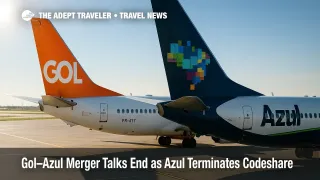Gol-Azul merger talks end as Azul terminates codeshare

Gol, controlled by Abra Group, has called off merger talks with Azul after months without progress. The carriers had signed a non-binding memorandum of understanding on January 15, 2025, to explore combining Brazilian operations. In a September 25, 2025 letter disclosed in securities filings, Abra cited Azul's focus on its Chapter 11 case for the lack of movement. Azul separately acknowledged the discontinuation and said it has terminated its codeshare agreement with Gol, adding it will honor all tickets issued under the partnership.
Key points
- Why it matters: The end of Gol-Azul merger talks preserves Brazil's three-airline market alongside Latam.
- Travel impact: Azul's termination of the codeshare ends reciprocal selling, but issued tickets remain valid.
- What's next: Azul continues Chapter 11; Gol emerged in June 2025 and is operating independently.
- MoU signed January 15, 2025; discussions stalled for months per Abra's letter.
- Codeshare launched in May 2024 and is now discontinued.
Snapshot
Abra Group, which also owns Avianca, informed Azul on September 25, 2025 that negotiations for a Gol-Azul business combination were over. The companies had executed an MoU on January 15, 2025, but Abra said there had been no meaningful progress for several months while Azul prioritized its U.S. Chapter 11 reorganization. Azul confirmed the talks are terminated and announced the end of its codeshare with Gol, stating it will honor all tickets issued under that agreement. The decision maintains competitive separation in Brazil's domestic market, where Latam, Gol, and Azul are the primary players. It also resets expectations after a year of speculation linking the codeshare to a broader tie-up.
Background
Gol filed for Chapter 11 protection on January 25, 2024 and completed its court-supervised restructuring on June 6, 2025. Its plan confirmation came on May 20, 2025. Azul filed for Chapter 11 on May 28, 2025 and has communicated plans to exit by early 2026, supported by DIP financing and agreements with key stakeholders and partners. The Gol-Azul domestic codeshare, announced in May 2024, linked networks that executives described as complementary and fueled merger speculation. While the cooperation improved one-stop connectivity within Brazil, it remained subject to competitive and regulatory scrutiny, including attention from Brazil's antitrust authority, CADE, due to the carriers' substantial combined share on domestic routes.
Latest developments
Abra ends negotiations; Azul pulls the plug on codeshare
In a securities filing dated September 25, 2025, Abra notified Azul that merger discussions were terminated, citing several months without material progress as Azul focused on Chapter 11. Azul released a market notice the same day confirming the end of talks and, crucially, separately announced the termination of the Gol-Azul codeshare established in May 2024. Both airlines said they will honor tickets already issued under the partnership, limiting near-term disruption for travelers who purchased itineraries spanning both carriers. With the MoU now shelved, Gol continues as a standalone operator following its June 2025 emergence from Chapter 11, while Azul remains concentrated on implementing its restructuring plan and court process.
Analysis
For travelers, the immediate effect is limited to booking mechanics and day-of-travel convenience. The loss of the Gol-Azul codeshare removes some one-ticket, one-PNR itineraries and through-check benefits that had simplified domestic connections across complementary networks. However, Azul's pledge to honor issued tickets should minimize short-term pain. Strategically, shelving the Gol-Azul merger averts a transformative consolidation that would have rebalanced Brazil's airline landscape against Latam. It also reduces antitrust complexity and integration risk while Azul remains in Chapter 11. From a financing standpoint, Gol's June 2025 emergence and Azul's stated early-2026 exit target imply divergent timelines; combining amid one party's active court process is rarely optimal. Expect each carrier to double down on operational reliability, network optimization, and balance-sheet repair. If Azul executes its plan and Brazil's demand holds, the industry will likely revisit consolidation scenarios later, but any renewed Gol-Azul talks would need cleaner capital structures and clearer regulatory pathways.
Final thoughts
With the Gol-Azul merger off and the codeshare gone, Brazil's competitive map stays intact for now. Travelers should expect fewer cross-carrier through-tickets, but already-issued trips remain protected. The longer-term question is whether post-restructuring economics bring consolidation back to the table. Until then, watch performance, pricing, and schedule moves as both airlines seek resilience without the tailwind of a Gol-Azul merger.
Sources
- Azul announces termination of discussions with Abra regarding potential business combination, Form 6-K, SEC
- GOL material fact: End of negotiations between Abra Group and Azul (press disclosure)
- GOL material fact: End of commercial cooperation via codeshare with Azul (press disclosure)
- GOL emerges from U.S. Chapter 11 process, press release
- Azul files Chapter 11 and outlines restructuring agreements, press release
- Abra ends Gol-Azul talks; background on codeshare timing, Reuters
- Azul aims to exit Chapter 11 in early 2026, Reuters
- Azul-Gol codeshare context, Reuters
